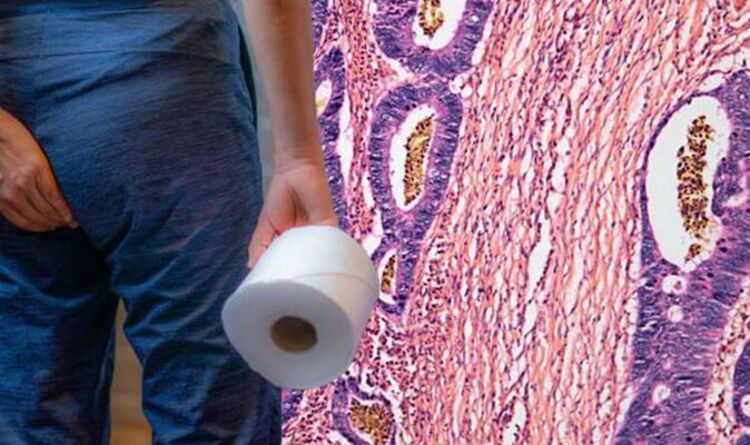Deborah James leaves hospital after bowel cancer surgery
We use your sign-up to provide content in ways you’ve consented to and to improve our understanding of you. This may include adverts from us and 3rd parties based on our understanding. You can unsubscribe at any time. More info
Bowel Cancer UK notes that over 42,000 people are diagnosed with bowel cancer every year in the UK. It is very important to get cancer spotted early, as this can help immensely. Indeed, it says bowel cancer is treatable and curable “especially if diagnosed early”. Sadly, survival rates drop as the disease develops, so the charity says “early diagnosis really does save lives”.
The bowel is part of the digestive system, which is necessary for breaking down food and moving undigested waste along towards the rectum to be excreted from the body. Unsurprisingly, many symptoms can show up when you go to the toilet.
Macmillan Cancer Support says symptoms of bowel cancer include blood in, or on, the bowel motions. It says the blood may be bright red or dark in colour.
Other changes include a change in your normal bowel habit, such as diarrhoea or constipation, for no obvious reason. Macmillan Cancer Support says when these last for longer than six weeks you should contact your GP.
Other signs include unexplained weight loss, pain in the tummy or back passage, a feeling of not having emptied your bowel properly after a bowel motion, or feeling tired and breathless.

Sometimes the cancer can cause a blockage in the bowel. The symptoms of this are being sick, pain in the abdomen or a bloated feeling.
The NHS explains: “When you first see a GP, they’ll ask about your symptoms and whether you have a family history of bowel cancer.”
According to the health body, your GP may carry out a number of tests.
“They’ll usually carry out a simple examination of your bottom, known as a digital rectal examination (DRE), and examine your tummy (abdomen).”
According to Cancer Research UK, a linked risk factor is obesity. “It is estimated that 11 out of 100 bowel cancers (11 percent) in the UK are linked to being overweight or obese.”
Bowel Cancer UK says that one in 15 men and one in 18 women will be diagnosed with bowel cancer during their lifetime.
The charity says: “If you have any symptoms, don’t be embarrassed and don’t ignore them.”
Some of the main conditions which share symptoms with bowel cancer are:
- Constipation
- Diarrhoea
- Piles (haemorrhoids)
- Anal fissures
- Irritable bowel syndrome (IBS)
- Diverticular disease
- Crohn’s disease
- Ulcerative colitis.
There are some known risk factors, though having one or more risk factors doesn’t mean that you will definitely get bowel cancer, however.
Although it is very difficult to research the link between diet and cancer, studies have shown certain foods can definitely affect the risk of bowel cancer.
Processed meat is any meat that has been treated to preserve it and/or add flavour – for example, bacon, salami, sausages, canned meat, or chicken nuggets.
The Government recommends that people eating more than 90g of red and processed meat a day should reduce it to 70g or less.

According to Cancer Research, a linked risk factor is obesity. It is estimated that 11 out of 100 bowel cancers (11 percent) in the UK are linked to being overweight or obese.
The charity says one should try to keep a healthy weight by being physically active and eating a healthy, balanced diet.
“There is strong evidence which shows that people who are more physically active have a lower risk of bowel cancer,” it says.
“There is strong evidence which shows that people who are more physically active have a lower risk of bowel cancer.”
Source: Read Full Article
